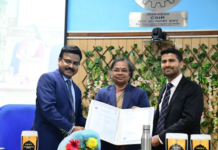
Marking the first carbon mitigation project in Japan under Dow’s official carbon partnership with the International Olympic Committee (IOC), Dow and Aeon – the largest retailer in Asia – signed a Carbon Project Agreement to reduce greenhouse gas (GHG) emissions and food loss by utilizing Dow technologies in food packaging solutions and practices. The Dow-Aeon Carbon Project Agreement is one of several projects executed by Dow and the IOC around the world as part of the carbon partnership program.
The international community aims to halve per capita global food waste at the retail and consumer levels as part of the United Nations Sustainable Development Goals (SDGs). With a reliance on imported crops, Japan’s food self-sufficiency rate is at a 25-year low. In contrast, 6.43 million tons of food in Japan are wasted per year due to food products that are unsold, unconsumed, or past the expiration date.
Role of packaging in reducing food loss
“Plastic packaging can play a critical role in reducing food loss, ensuring consumer safety and meeting environmental goals of lowering carbon emissions,” said Nicoletta Piccolrovazzi, circular economy market director for Dow and global technology and sustainability director for Dow Olympic and Sports Solutions. “At Dow, we foster collaboration across the value chain – film producers, converters, equipment manufacturers, brand owners, and retailers – to promote packaging solutions that support resource efficiency and a more circular economy. In teaming up with Aeon on this project, the goal is twofold – integrate new packaging technologies that preserve food freshness and deliver quantifiable environmental impacts while raising awareness with consumers on the issue of food loss and its importance.”

In 2017, Aeon committed to contributing to the industry’s SDG by setting a target of halving the company’s food waste by 20253. Aeon started adopting the use of vacuum skin packaging (VSP) for several types of food in its stores owned by group companies. Supported by Dow’s lonomer technology (in Japan, a joint venture, Dow-Mitsui Polychemicals manufactures and markets under a license from Dow), VSP extends the shelf life of products and offers better protection during shipment, leading to food loss mitigation and carbon reduction throughout the lifecycle.
“Powered by our vision for a low carbon society and a country with zero food waste, Aeon has set challenging yet attainable sustainability goals for our company and customers that will contribute to the industry’s effort to help build a sustainable future,” said Aeon. “This agreement will accelerate our goals through this first-of-its-kind food packaging collaboration in Japan.”
Aeon’s group company – Daiei, made a trial sale in November 2019 with four of its beef products. Since then, they have expanded their product lineups to include poultry and lamb packaged products, with plans to increase the store count and expand this packaging solution to seafood application.
According to the press release, the collaboration with Dow and AEON will drive the adoption of more sustainable solutions to mitigate GHG emissions throughout the products’ life cycle. The resulting climate benefits will be validated by a third party and contribute to Dow’s Official Carbon Partnership with the IOC.
“Through the reduction in food loss and food waste, combined with the need for less packaging material, VSP provides a better-protected product with an improved environmental footprint,” said Taro Fukuzaki, executive vice president, Dow-Mitsui Polychemicals. “This technology removes nearly all residual oxygen from the package, which leads to the extended shelf life of products and better protection during shipment, but also minimizes the need for added preservatives depending on its applications. The strong sealant and surface adhesion to meats and seafood helps minimize the migration of liquids and presents a cleaner package to the consumer.”
Dow’s Carbon Partnership with the IOC aims to build a positive legacy of low-carbon business practices and drive action-focused collaborations against climate change. Initiated in 2017 to balance the IOC’s operational carbon footprint and beyond, the partnership encourages organizations outside the Olympic movement to adopt programs for reducing carbon emissions while catalyzing change across value chains. Dow also recently committed to additional global carbon emissions reduction targets, including achieving carbon neutrality by 2050.
IndiFoodBev — authentic, impactful and influential
An English-language food and beverage processing and packaging industry B2B platform in print and web, IndiFoodBev is in its third year of publication. It is said that the Indian food and beverage industries represent approximately US$ 900 billion in revenues which implies more than 20% of the country’s GDP. Eliminating the wastage on the farmside can help to deliver more protein to a higher number of the population apart from generating sizable exports. The savings in soil, seeds, water, fertilizer, energy and ultimately food and nutrition could be the most immense contribution that country is poised to make to the moderation of climate change.
To improve your marketing and grow sales to the food and beverage processing and packaging industry, talk to us. Our research and consulting company IppStar [www.ippstar.org] can assess your potential and addressable markets in light of the competition. We can discuss marketing, communication, and sales strategies for market entry and growth.
Suppliers and service providers with a strategy and budget for targeted marketing can discuss using our hybrid print, web, video, and social media channels to create brand recognition linked to market relevance. Our technical writers are ready to meet you and your customers for content.
The second largest producer of fruit and vegetables in the world is continuously expanding processing capacities and delivery systems with appropriate innovative technologies. We cover product and consumer trends, nutrition, processing, research, equipment and packaging from farm to thali. Get our 2025 media kit and recalibrate your role in this dynamic market. Enhance your visibility and relevance to existing markets and turn potential customers into conversations. Ask for a sample copy of our bi-monthly in print or our weekly IndiFoodBev eZine each Wednesday.
For editorial info@ippgroup.in — for advertisement ads1@ippgroup.in and for subscriptions subscription@ippgroup.in
Naresh Khanna – 10 February 2025
Subscribe Now










